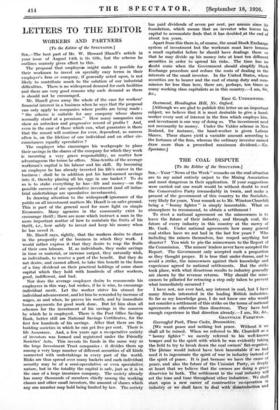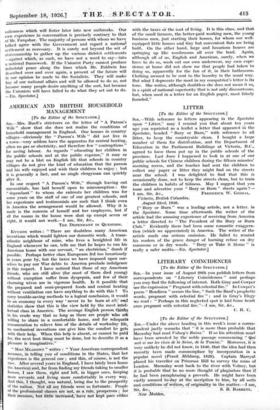THE COAL- DISPUTE
[To the Editor of the SPECTATOR.]
Sta,—Your "News of the Week" remarks on the coal situation are to my mind entirely unjust to the Mining Association and most dangerous in their application. If your suggestions were carried out one result would be without doubt to rend the Conservative Party irremediably in twain, and make a present of the government of this country to the Socialists, very likely for years, Your remark as to Mr. Winston Churchill being a " bonny fighter " is simply lamentable. What an atmosphere to recommend, to obtain a settlement
To rivet a national agreement on the mineowners is to leave the future of their industry, and through coal, the future of every industry in this country at the mercy of Mr. Cook. Under, national agreements how many general coal strikes have we not had in the last few years ? Who including the miners themselves, has reaped anything but disaster ? You wish to pin the mineowners to the Report of the Commission. , The miners' leaders never have accepted the Report. The Government only accepted such a proportion as they thought proper. It is true that under duress, and to avoid a strike, the mincowners against their knowledge and' experience agreed to national settlements. But the strike took place, with what disastrous results to industry generally are shown by the revenue returns. Why should the mine- owners be pilloried for retracing a step only taken to prevent what immediately occurred ?
I have not, nor ever had, any interest in coal, but I have many friends interested in the leading British industries. So far as my knowledge goes, I do not know one who would not consider a settlement of this strike on the terms of national agreements as otherwise than disastrous. They have had enough experience in that direction already.—I am, Sir, &C.1
GRANVILLE' FARQUHAR.
Gwernyfed Park, Three Cocks, Breconshire.
[We want peace and nothing but peace. Without it we shall all be ruined. When we referred to Mr. Churchill as a. " bonny fighter " we merely referred to his well-known temper and to the spirit with which he was evidently taking the field to try to break down the coal owners' flat-negation. The phrase would indeed have been lamentable if we had used it to ingeminate the spirit of war in industry instead of the spirit of peace. It is just because we have the cause of peace, and also the future of the UniOnist Party, so deeply, at heart that we believe that the owners are doing a grave disservice to both. The settlement in the coal industry will set the tone and tune throughout other industries:. We shall start Upon a new career of constructive co-operation in industry or we shall have to deal with' dissatisfaction .and sullenness which will fester later into new Outbreaks." Our own experienee in conversation is precisely contrary to that of Mr. Farquhar. The majority of persons with whom we have talked agree- with the Government and regard a rational settlement as necessary.- It is surely not beyond the wit of statesmanship to gather up the various district settlements —against which,-as such, we have not a word to say—into a national framework. If the Unionist Party cannot produce industrial peace along the lines which Mr. Baldwin has described over and over again, a present of the future will in our opinion be made to the Socialists. They will make hay of our national affairs and will be allowed to do so, not because many people desire anything of the sort, but because the Unionists will have failed to do what they set Out to do. —En. Spectator.]































































 Previous page
Previous page